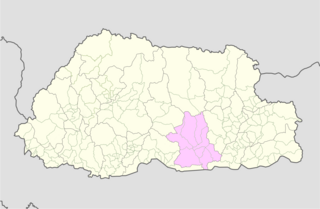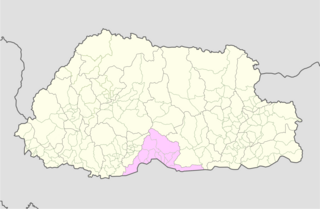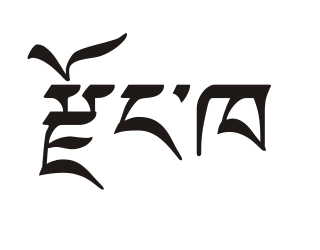
Bhutan comprises twenty districts.

Trashiyangtse District is one of the twenty dzongkhags (districts) comprising Bhutan. It was created in 1992 when Trashiyangtse district was split off from Trashigang District. Trashiyangtse covers an area of 1,437.9 square kilometres (555.2 sq mi). At an elevation of 1750-1880 m, Trashi yangtse dzongkhag is rich of culture filled with sacred places blessed by Guru Rimpoche and dwelled by Yangtseps, Tshanglas, Bramis from Tawang, Khengpas from Zhemgang and Kurtoeps from Lhuentse.

A gewog, in the past also spelled as geog, refers to a group of villages in Bhutan. The head of a gewog is called a gup. Gewogs form a geographic administrative unit below dzongkhag districts, and above Dzongkhag Thromde class B and Yenlag Thromde municipalities. Dzongkhag Thromde class A municipalities have their own independent local government body.

Trongsa District is one of the districts of Bhutan. It is the most central district of Bhutan and the geographic centre of Bhutan is located within it at Trongsa Dzong.

Ngangla Gewog is a gewog of Zhemgang District, Bhutan, bordering India. Ngangla Gewog is also a part of Panbang Dungkhag (sub-district), along with Goshing, Bjoka, and Phangkhar Gewogs.

Logchina Gewog is a gewog of Chukha District, Bhutan. The gewog has an area of 70.4 square kilometres and contains 12 villages. Logchina Gewog is part of Phuentsholing Dungkhag (sub-district), along with Dala, Sampheling, Dungna, Metakha and Phuentsholing Gewogs.

Chiwogs of Bhutan or chios refer to the 1044 basic electoral precincts of Bhutan. Chiwogs are also former third-level administrative divisions of Bhutan below geos. Until 2009, they were the equivalent of municipalities or parishes, containing clusters of villages and hamlets. There are generally 5 or 6 chios in each geo, and in turn several geos in each dzongkha (district). To illustrate, there are 50 chios in Paro District alone. The majority of chios are small rural communities; more densely populated areas tend to be separate thromdes, or municipalities. A Chiwog Disaster Management Plan (CDMP) exists in some chios to form an effective responsive to any local disasters. Often, participants in the CDMP are also trained at a geo level for better coordination.

Umling Gewog is a gewog of Sarpang District, Bhutan.

Bardo Gewog is a gewog of Zhemgang District, Bhutan.

Bjoka Gewog is a gewog of Zhemgang District, Bhutan. Bjoka Gewog is also a part of Panbang Dungkhag (sub-district), along with Goshing, Ngangla, and Phangkhar Gewogs.

Nangkor Gewog is a gewog of Zhemgang District, Bhutan.

Phangkhar Gewog is a gewog of Zhemgang District, Bhutan. Phangkhar Gewog is also a part of Panbang Dungkhag (sub-district), along with Goshing, Ngangla, and Bjoka Gewogs.

Shingkhar Gewog is a gewog of Zhemgang District, Bhutan.

Trong Gewog is a gewog of Zhemgang District, Bhutan.

Norbugang Gewog is a gewog of Pemagatshel District, Bhutan. Norbugang Gewog is part of Nganglam Dungkhag, along with Dechenling and Nganglam Gewogs.

Lauri Gewog is a gewog of Samdrup Jongkhar District, Bhutan. It was also part of Jomotsangkha Dungkhag (sub-district), together with Serthi Gewog.

Khaling Gewog is a gewog of Trashigang District, Bhutan. Khaling and Lumang Gewogs comprise Wamrong Dungkhag (sub-district).

Thrimshing Gewog is a gewog of Trashigang District, Bhutan. Thrimshing Gewog, along with Kangpara Gewog, comprises Thrimshing Dungkhag (sub-district)












